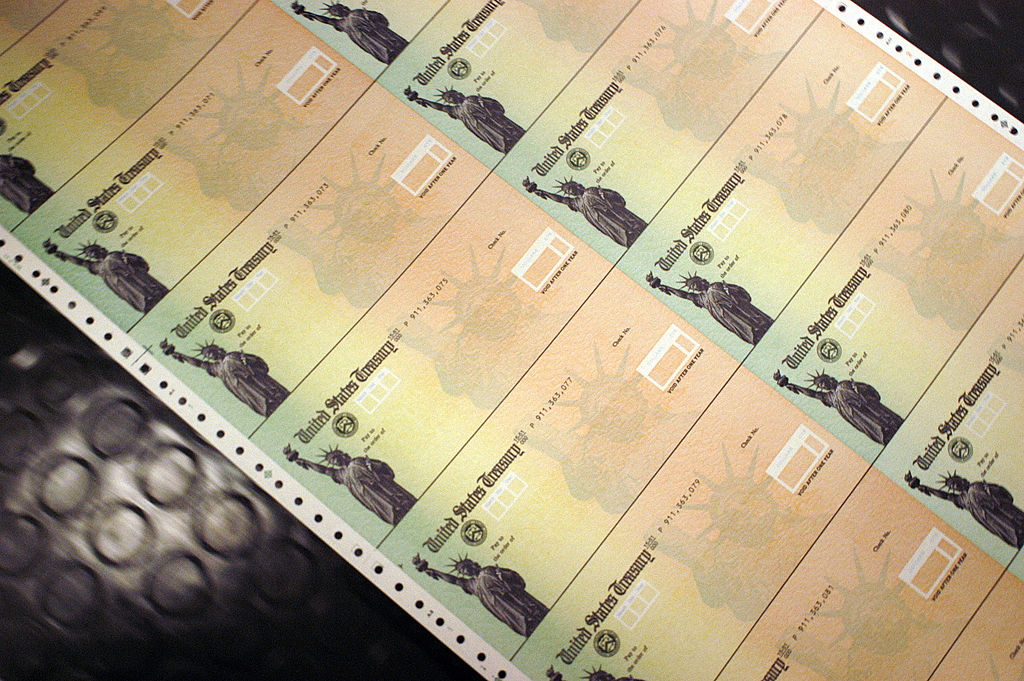Most Americans will get coronavirus stimulus check in April. Here's how the program works.


A free daily email with the biggest news stories of the day – and the best features from TheWeek.com
You are now subscribed
Your newsletter sign-up was successful
The Senate unanimously passed a massive $2.2 trillion coronavirus emergency rescue package late Wednesday, and among its many tools to bolster the economy amid the COIVD-19 pandemic is $290 billion set aside for direct payments to most Americans. Assuming the House passes the bill, expected to happen Friday, and President Trump signs it, most Americans will get a one-time payment of about $1,200 sometime in April, Treasury Secretary Steven Mnuchin says.
The payments will be based on tax returns from 2019 or 2018. Generally speaking, individuals with an adjusted gross income up to $75,000 will get $1,200 checks, or $2,400 for couples earning up to $150,000. Couples and "head of household" single parents will also get $500 per child. The checks taper off up to $99,000 in income per individual and $198,000 for joint filers with no children. The Washington Post has a calculator for estimating how much money your check should contain. Kiplinger also has a helpful stimulus calculator.
About 125 million people, or 83 percent of tax filers, will get checks, says Kyle Pomerleau at the American Enterprise Institute. "The main people excluded from receiving a payment are: the wealthy, nonresident aliens (i.e. foreigners who do not hold a green card), and 'dependents' who can be claimed on someone else’s tax return.," the Post reports.
The Week
Escape your echo chamber. Get the facts behind the news, plus analysis from multiple perspectives.

Sign up for The Week's Free Newsletters
From our morning news briefing to a weekly Good News Newsletter, get the best of The Week delivered directly to your inbox.
From our morning news briefing to a weekly Good News Newsletter, get the best of The Week delivered directly to your inbox.
Many Americans won't actually get a paper check. The first people to get funds from the program will be those who have direct deposit information on file with the Internal Revenue Service from 2019 returns, filed this year, or 2018 returns. If the IRS does not have your direct deposit information, it will send a check to the mailing address it has on file. "People who don't pay taxes, such as those with very low incomes, may be hard to reach the way the program is designed," Politico notes.
"The last time the U.S. government did anything like this, back in 2008," the Post reports, "the payments went out in batches and it took about eight weeks for the final people to receive their checks."
A free daily email with the biggest news stories of the day – and the best features from TheWeek.com
Peter has worked as a news and culture writer and editor at The Week since the site's launch in 2008. He covers politics, world affairs, religion and cultural currents. His journalism career began as a copy editor at a financial newswire and has included editorial positions at The New York Times Magazine, Facts on File, and Oregon State University.
-
 Political cartoons for February 12
Political cartoons for February 12Cartoons Thursday's political cartoons include a Pam Bondi performance, Ghislaine Maxwell on tour, and ICE detention facilities
-
 Arcadia: Tom Stoppard’s ‘masterpiece’ makes a ‘triumphant’ return
Arcadia: Tom Stoppard’s ‘masterpiece’ makes a ‘triumphant’ returnThe Week Recommends Carrie Cracknell’s revival at the Old Vic ‘grips like a thriller’
-
 My Father’s Shadow: a ‘magically nimble’ film
My Father’s Shadow: a ‘magically nimble’ filmThe Week Recommends Akinola Davies Jr’s touching and ‘tender’ tale of two brothers in 1990s Nigeria
-
 A Nipah virus outbreak in India has brought back Covid-era surveillance
A Nipah virus outbreak in India has brought back Covid-era surveillanceUnder the radar The disease can spread through animals and humans
-
 Trump HHS slashes advised child vaccinations
Trump HHS slashes advised child vaccinationsSpeed Read In a widely condemned move, the CDC will now recommend that children get vaccinated against 11 communicable diseases, not 17
-
 Covid-19 mRNA vaccines could help fight cancer
Covid-19 mRNA vaccines could help fight cancerUnder the radar They boost the immune system
-
 FDA OKs generic abortion pill, riling the right
FDA OKs generic abortion pill, riling the rightSpeed Read The drug in question is a generic version of mifepristone, used to carry out two-thirds of US abortions
-
 The new Stratus Covid strain – and why it’s on the rise
The new Stratus Covid strain – and why it’s on the riseThe Explainer ‘No evidence’ new variant is more dangerous or that vaccines won’t work against it, say UK health experts
-
 RFK Jr. vaccine panel advises restricting MMRV shot
RFK Jr. vaccine panel advises restricting MMRV shotSpeed Read The committee voted to restrict access to a childhood vaccine against chickenpox
-
 Texas declares end to measles outbreak
Texas declares end to measles outbreakSpeed Read The vaccine-preventable disease is still spreading in neighboring states, Mexico and Canada
-
 RFK Jr. shuts down mRNA vaccine funding at agency
RFK Jr. shuts down mRNA vaccine funding at agencySpeed Read The decision canceled or modified 22 projects, primarily for work on vaccines and therapeutics for respiratory viruses
